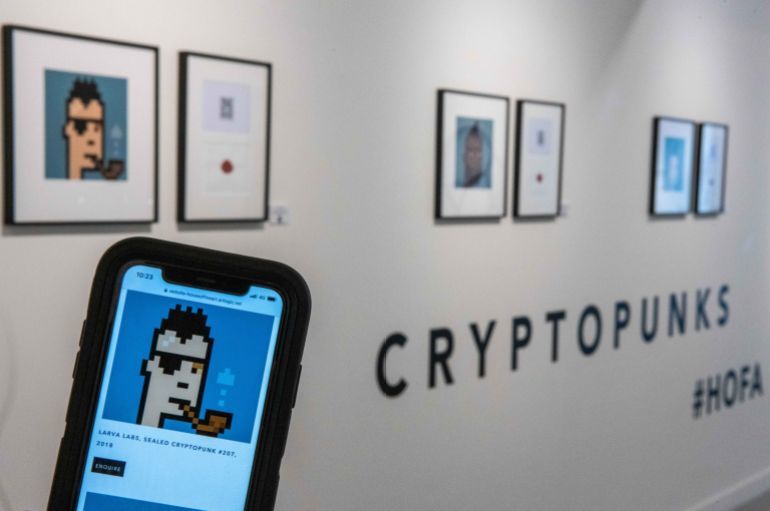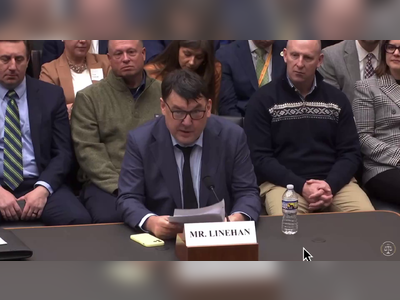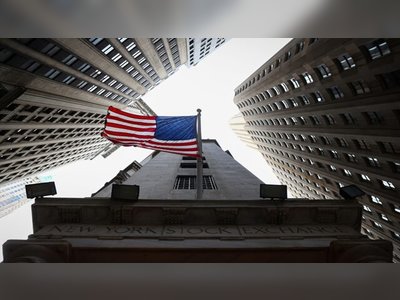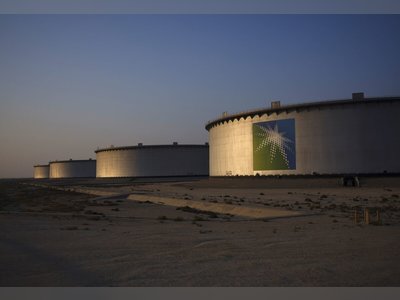
NFTs had a breakthrough year – What’s next for them?
When Canadian artist Trevor Jones graduated 14 years ago from the University of Edinburgh, in Scotland, he was quickly confronted by the harsh realities of the art world.
“I had some decent exhibitions and gallery shows,” he told Al Jazeera. “But it was no way to pay the bills. I was working three different jobs at the time.”
In the early 2010s, he got interested in the intersection between technology and art, and started experimenting with QR codes and augmented reality. These themes received a lukewarm response from the established art world, but he pushed on. In 2017 he invested in the rising cryptocurrency Bitcoin, promptly losing his money in the 2018 crash.
“I found out I was a much better painter than an investor,” he joked. “But it opened up a whole new world that I could explore through painting.”
Since then he has been making cryptocurrency-themed works, mixing classical painting and crypto themes, often with digital art pieces attached to them in the form of non-fungible tokens (NFTs).
NFTs are unique digital files underpinned by blockchain technology – the same tech that anchors Bitcoin – and the blockchain ledger they sit on verifies who the rightful owner is of that one-of-a-kind digital asset, giving it a provenance.
Demand for NFTs started taking off late last year, with interest in them exploding this year – along with Jones’s fortunes.
His first NFT project sold in 2019 for $10,000 – a huge amount of money at the time. In October 2020, he sold an NFT of Batman together with comic book artist José Delbo for $552,000. Then this February, he sold 4,158 editions of his most famous work, Bitcoin Angel, which mixes Bernini’s The Ecstasy of Saint Teresa with crypto imagery, for $3.2m.
“When you’re a poor, struggling painter you just want to sell your work to pay rent and put some food on the table,” Jones said. “It’s a struggle to be creative under those conditions. Now I’m in a position to do a collaboration with Ice Cube.”
Pixels and provenance
NFTs have supported this year’s most-hyped art sales.
The opening shot for the gold rush was fired in March, when United States-based artist Mike Winkelmann, also known as Beeple, sold an NFT of his digital artwork Everydays: The First 5000 Days, for a whopping $69m at auction house Christie’s.
Christie’s also partnered with NFT trading platform OpenSea at the end of November to cash in on the trend. Celebrities such as Paris Hilton, Snoop Dogg and Lindsay Lohan and even World Wide Web inventor Tim Berners-Lee made and sold NFTs this year.
Another major trend unfolded with avatar-like portrait drawings sold as NFTs. The most popular project in the space is called CryptoPunks. At the time of this writing, the lowest-priced CryptoPunk could be bought for $242,918, while the most expensive carried a price tag of $7.58m.
The Bored Ape Yacht Club, which boasts celebrity members including Jimmy Fallon and Steph Curry, saw a bundle of 101 NFTs resell at auction at Sotheby’s for $24.4m in September.
Beyond the bragging rights of being on the cutting edge of a new crypto trend, investors are also willing to wager on the idea that pixels with an attached provenance will continue to be desirable collectibles.
“When you make an NFT there’s always a limited number of them,” Yan Ketelers, CMO at Venly, a Belgian startup that builds NFT marketplaces, told Al Jazeera. “Whenever you sell them, it gets registered on a blockchain.”
 A gallery assistant at London’s House of Fine Art (HOFA) Gallery in the
United Kingdom holds a smartphone displaying a signed lithograph ‘Sealed
Cryptopunk #207’ by Larva Labs
A gallery assistant at London’s House of Fine Art (HOFA) Gallery in the
United Kingdom holds a smartphone displaying a signed lithograph ‘Sealed
Cryptopunk #207’ by Larva Labs
These NFTs can in turn be sold by their owners, creating a fertile ground for trade on NFT marketplaces like OpenSea or Nifty Gateway.
But while NFTs benefit from the property rights bestowed by the blockchain, they also suffer from the technology’s hefty carbon footprint.
Most blockchain networks rely on so-called miners whose rigs – often comprised of thousands of energy-guzzling computers – race to solve complex math puzzles, with the winner being rewarded with cryptocurrency.
The Ethereum blockchain, on which most NFTs are registered, currently uses more energy than the entire country of the Philippines. “This digital system has a huge impact in the real world,” said Alex de Vries, owner of Digiconomist, a site that calculates the energy use of blockchain networks like Ethereum.
In his day job, de Vries is also a member of the financial crimes unit of the Dutch central bank. “That’s not what we want in the age of climate change, when we’re supposed to lower our emissions,” he said.
But for blockchain proponents, this is a transitory problem. According to Ketelers, miners are quickly moving to sources of clean energy, and blockchain systems are experimenting with new ways of doing business. Venly for example often uses Polygon, a network that is still built on top of Ethereum, but uses a system that would cut up to 99 percent of the energy use of the so-called proof of work systems described earlier.
“I don’t think the environmental critique still makes a lot of sense,” said Ketelers.
Yet according to de Vries, the problem hasn’t been solved yet. More eco-friendly blockchain networks do exist, but the bigger ones like Ethereum are still energy guzzlers. Ethereum has also been wanting to move away from proof of work for years, but has been unsuccessful so far.
And while sceptics may dismiss NFTs as a fad, evangelists argue that the “metaverse” – a vague term used to describe a more immersive future version of the internet populated by avatars – is poised to push them into the mainstream through applications such as video games, Venly’s main business.
“Imagine that everything you build or buy in a game becomes your property,” said Ketelers. “It becomes part of your identity, and you can even sell the assets.”
That is already happening to a degree. The market for game skins, cosmetic upgrades for in-game items such as guns, reached $30bn in 2018, according to Juniper Research. Yet with NFTs, players could really own these items, independent of game developers, and even start trading them on third-party marketplaces – which could allow burgeoning virtual economies to rise up.
Venly supports game developers like Atari with ideas like this.
But like crypto bubbles past, the NFT hype might also collapse in the future. “I learned how fast things can take off in the crypto world, but also how fast they can crash,” said Jones. “Bitcoin has been called dead many times in the past few years, but it just keeps rising up like a phoenix.”
This is why Jones is preparing for volatility. He hasn’t bought anything extravagant with his newfound wealth, just a new car (albeit a Tesla). And next year he is renting out Stirling Castle in Scotland to host a party for the collectors who own his art – a luxury in some ways, but one he sees as good business.
“I need to grow my brand and community to survive the eventual bear market,” he said. “There will be a lot of artists who will disappear, and projects that will go to zero. Everybody knows it. But some artists will succeed and come out the other end. I hope I will be one of them.”











